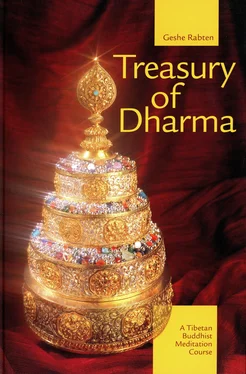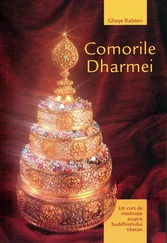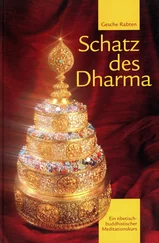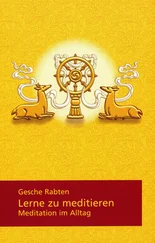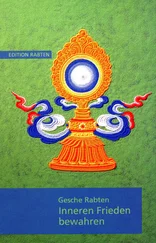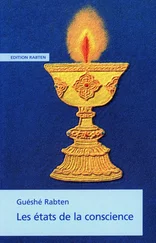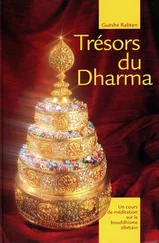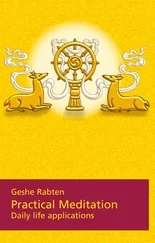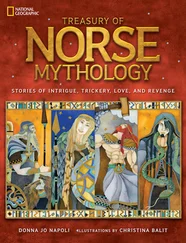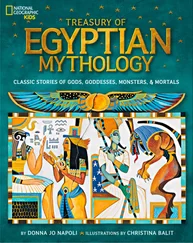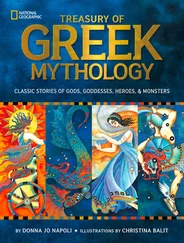Géshé Rabten - Treasury of Dharma
Здесь есть возможность читать онлайн «Géshé Rabten - Treasury of Dharma» — ознакомительный отрывок электронной книги совершенно бесплатно, а после прочтения отрывка купить полную версию. В некоторых случаях можно слушать аудио, скачать через торрент в формате fb2 и присутствует краткое содержание. Жанр: unrecognised, на английском языке. Описание произведения, (предисловие) а так же отзывы посетителей доступны на портале библиотеки ЛибКат.
- Название:Treasury of Dharma
- Автор:
- Жанр:
- Год:неизвестен
- ISBN:нет данных
- Рейтинг книги:3 / 5. Голосов: 1
-
Избранное:Добавить в избранное
- Отзывы:
-
Ваша оценка:
- 60
- 1
- 2
- 3
- 4
- 5
Treasury of Dharma: краткое содержание, описание и аннотация
Предлагаем к чтению аннотацию, описание, краткое содержание или предисловие (зависит от того, что написал сам автор книги «Treasury of Dharma»). Если вы не нашли необходимую информацию о книге — напишите в комментариях, мы постараемся отыскать её.
Treasury of Dharma — читать онлайн ознакомительный отрывок
Ниже представлен текст книги, разбитый по страницам. Система сохранения места последней прочитанной страницы, позволяет с удобством читать онлайн бесплатно книгу «Treasury of Dharma», без необходимости каждый раз заново искать на чём Вы остановились. Поставьте закладку, и сможете в любой момент перейти на страницу, на которой закончили чтение.
Интервал:
Закладка:
As long as we continue revolving in this cycle of existence there is no possibility of true and lasting happiness. Since this is so, it is very important to think deeply about our suffering and the nature of our predicament. When we realize that we are suffering we must decide whether or not we wish to continue doing so. If we reflect, we will see that no one likes to suffer. Even animals try to avoid unpleasant situations. Having decided that we do not wish to continue in this painful state we must set about finding a means of freeing ourselves. It is not enough merely to complain about our suffering, we must do something about ending it.
The first thing we must do is find the source of the trouble. Without first determining its cause there will be no way of stopping our unhappiness. If we travel from country to country, or even leave for another planet, we would not be able to escape sorrow. I need not explain this in great detail; it is obvious that we do not leave our troubles behind us by merely moving somewhere else. Hence we must find the cause of our suffering and then we must eliminate that cause. By doing so its result will automatically be extinguished as well. If our house has a hole in its roof, but rather than patching the hole we simply move to another room in the house, we don’t solve anything. As our overriding task is to rid ourselves of suffering we must find a way of doing so, and whether we call this method Dharma or not is of no consequence. What does matter is that we should apply it.
Suffering is the result of a main cause and of contributing circumstances. All conditioned phenomena are affected by these two factors. Even a flower growing in the garden outside is subject to these factors. Its main or principal cause is the seed from which it germinates, while its circumstances or conditions are such things as sunshine, fertilizer, the gardener’s care, and so on. All of these aid in its growth. In the same way, both happiness and sorrow must have a main cause and contributing circumstances, just as a beautiful flower and a poisonous weed must both have a seed and the proper conditions conducive to their growth. If we wish to have a garden free of ugly weeds we must get rid of the seeds that cause the weeds to grow. And if we want to be happy we must put an end to the causes for unhappiness.
The elimination of the cause of suffering and the growth and development of happiness depend entirely on our own effort. Through the combination of the power of the Dharma and our own effort in practice all goals can be achieved. But without this personal effort, although the Dharma may be very effective, it cannot uproot the cause of suffering. It is similar to a very sophisticated machine which, although it may be highly efficient and able to perform countless tasks, must still have someone at the controls. Without an operator, even with all its versatility, a machine will not be able to produce anything. It is through the combination of man and machine that production is possible. Such examples may make it easier to understand this point.
All the suffering and happiness we experience has a cause. The cause of happiness is wholesome actions and the cause of suffering is unwholesome actions. Because in the past we have engaged in negative activities we have built up the causes for our present and future suffering. If the causes were not present there would be no possible way in which an effect could arise. These same conditions apply to happiness as well. If we engage in positive actions, since they are the cause of happiness, we will subsequently experience their fruit. There is no other possible way in which experiences can come into being. They are solely dependent on their specific causes; our suffering and our happiness come about as a result of our own actions.
Some of you may wonder why, although you have not committed any extremely bad actions, you have suffered a great deal. It may be true that we have not done negative actions in this life, but we have in all likelihood done so in previous lives, and therefore the suffering that we go through now is a result of such actions. When we begin to speak of past and future lives, it may present difficulties for a person who does not understand this concept. But I will be explaining more about this as we go along. The fact that we have been born as human beings is dependent upon good actions that we have performed in previous lives. The concept may be subtle but it is based on the same principle that determines that a tulip bulb will grow into a tulip while an iris bulb will grow into an iris. The principal cause of our rebirth as a human being was our own wholesome actions. One of the circumstantial causes was our parents. The principal cause of the tulip was its bulb; the circumstances, sunlight, soil and water. The main point here is that particular causes give rise to particular effects.
The teaching is now becoming more complex and some of you may be finding it harder to understand. But as the subjects grow more complicated we must make a greater effort and think more deeply about them.
Karma
The Sanskrit word for action is Karma. There are various types of Karma or action, some of which are not a cause for cyclic existence (Skt. Samsara), but here we are speaking of Karma which is such a cause. This Karma is divided into two categories: propulsive Karma and accomplishing Karma. For example, we can see how these two types are necessary in the case of a human rebirth. Propulsive Karma determines the birth as a human one and accomplishing Karma determines the circumstances of that individual’s life. Such positive actions as, for example, observing pure moral conduct, refraining from killing or stealing and other harmful acts, become the propulsive Karma for a human rebirth. Such actions determine the kind of birth. But having been born a human being, there are many aspects of one’s life that are determined by the accomplishing Karma. The practice of giving produces the accomplishing karmic cause for someone whose needs are being satisfied. The practice of patience generates the accomplishing karmic cause for an attractive and healthy body. While helping others when they are ill and saving others from danger is the cause for a life uninterrupted by sickness or other physical problems. Humility provides the accomplishing karmic cause which results in being respected by others, and refraining from telling lies is the cause of having one’s words believed and trusted.
These concepts may cause doubts to arise in your mind. You may think that the wealth or amenities that you enjoy are the results of your own effort. ‘When I was young I chose an occupation and I have worked for what I have achieved.’ In fact, the job and the fruits of our labour are conditions for our achievements, while the main cause is a result of previous actions. It is through a combination of this principal cause produced in previous lives and personal effort in this life that one obtains wealth and happiness. If we disregard this main cause and think that conditions or circumstances alone can give rise to these experiences, then it becomes difficult to explain why when some people work just as hard as anyone else their efforts do not seem to produce the same effect. So if we desire real happiness in the future we must begin to prepare the ground for it now.
Now let us consider this from the point of view of negative actions. For example, there are people born in very poor countries whose lives are fraught with difficulty. These difficulties are a result of previous actions. They have, of course, produced positive actions in the past, such as observing pure moral conduct, in order to have been born as human beings. But in spite of this they have been born in difficult circumstances. This is a result of their accomplishing Karma. In previous lives they displayed great attachment and avarice towards their possessions and were habitually lacking in generosity and charity. As a result, they now suffer from want. Wealth is a result of generosity, whereas poverty is a result of avarice. Also, some people who are born as human beings may have a very unattractive appearance or a weak and frail body. Their being born human is a result of wholesome actions, but because they lacked patience or had strong hatred in previous lives their accomplishing Karma has resulted in an ugly, misshapen or feeble body. Just as patience generates the future karmic fruit of beauty, hatred produces the opposite. So if in the future we wish to be attractive we must begin now to practise patience. Someone who is constantly experiencing danger, hardship or many mishaps in his life such as illness or accidents is reaping the effects of his accomplishing Karma which was produced by interfering with and causing danger and harm to the lives of others.
Читать дальшеИнтервал:
Закладка:
Похожие книги на «Treasury of Dharma»
Представляем Вашему вниманию похожие книги на «Treasury of Dharma» списком для выбора. Мы отобрали схожую по названию и смыслу литературу в надежде предоставить читателям больше вариантов отыскать новые, интересные, ещё непрочитанные произведения.
Обсуждение, отзывы о книге «Treasury of Dharma» и просто собственные мнения читателей. Оставьте ваши комментарии, напишите, что Вы думаете о произведении, его смысле или главных героях. Укажите что конкретно понравилось, а что нет, и почему Вы так считаете.
